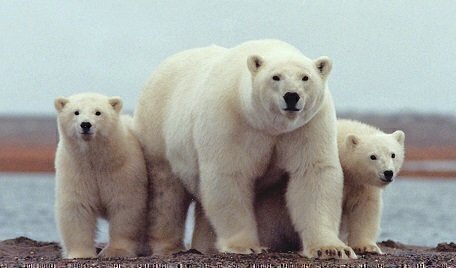A controversy over Alaskan polar bears won’t be decided by the Supreme Court, leaving a policy in place regulating the bear’s potential environment. And in this case, the Trump administration agrees with a Ninth Circuit ruling.
 Without comment, the nine Justices declined on Monday to take the case of Alaska v. Zinke, where the state of Alaska asked the Court to examine an Interior Department decision to designate 187,000 acres as a critical habitat for polar bears.
Without comment, the nine Justices declined on Monday to take the case of Alaska v. Zinke, where the state of Alaska asked the Court to examine an Interior Department decision to designate 187,000 acres as a critical habitat for polar bears.
The Fish & Wildlife Service recognizes the polar bear as a threatened species under the Endangered Species Act. Its protection within a critical habitat means that federal agencies have to investigate and consider any actions that might affect polar bears or their habitat.
The state of Alaska was joined by the Alaska Oil and Gas Association, the American Petroleum Institute, regional organizations and some Alaska Native groups, who argued that in 2010 the federal government wrongly designated the huge area without determining if many bears actually lived there.
Back in 2013, a federal district judge agreed with the state of Alaska, saying that habitat designation was an overreach of the Endangered Species Act. But last February, the Ninth Circuit Court of Appeals overturned that decision when a panel of three circuit judges agreed with the Fish & Wildlife Service’s criteria for polar bear protection.
“The panel held that the FWS’s designation of polar bear habitat was not arbitrary, capricious or otherwise in contravention of applicable law,” said Senior Circuit Judge Mary M. Schroeder.
Schroeder and the two other Ninth Circuit appeals judges agreed with the Fish & Wildlife Service, which said that the Endangered Species Act didn’t require proof that “existing polar bears actually use the designated area.” Instead, the Service just needed to show it followed a procedure to prove “that the area is critical to the future recovery and conservation of the species.”
The state appealed and asked the Supreme Court to consider if the Ninth Circuit used an “exceedingly permissive standard” to establish a critical habitat where “ much of the designated area fails to meet the statutory criteria.”
In its most recent court filing, the Trump administration’s Justice Department agreed with the Ninth Circuit Court’s reasoning and asked for the Supreme Court to deny a hearing. The federal government also argued that the Fish & Wildlife Service had changed its critical habitat designations recently, triggering a new legal challenge in Alabama and making the lawsuit in Alaska irrelevant.
“That review, in combination with the changes that have already been made, substantially limits the prospective importance of the decision below, which applied a now-superseded version of the regulations,” the Justice Department concluded.
Scott Bomboy is the editor in chief of the National Constitution Center.







